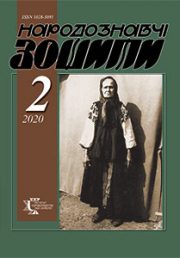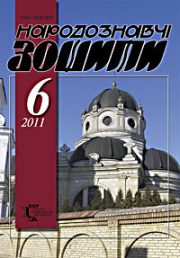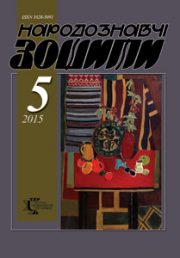The Ethnology Notebooks. 2023. № 4 (172), 1095—1102
UDK 75.05-026.765(477)”1950/2010″
DOI https://doi.org/10.15407/nz2023.04.1095
FOLK PAINTINGS OF NINA SHUPLYAK: GRAVITY OF UKRAINIAN TRADITION
SHPAK Oksana
- ORCID ID: https://orcid.org/0000-0002-9719-4432
- Candidate of art studies,
- Senior researcher,
- Ethnology Institute of National Academy of Sciences of Ukraine,
- Folk Art Department,
- 15, Svoboda Avenue, 79000, Lviv, Ukraine,
- Contacts: e-mail: shpak.oksana@gmail.com
Abstract. Article is considered the significant painting work of Nina Dmitrivna Shupliak (Cherkevych), who during the 1950s—2010s. worked, and continues to create in various genres of Ukrainian folk painting (story and everyday life, portrait, still life, landscape), turns to religious themes (icon, religious painting), paints on literary themes, creates decorative compositions. The stylistics of her works in the 1950s and 1970s. can be described as «naive», and the painting of the 1980s—2010s. — as an «author’s folk painting».
The purpose of the article is to use the example of the artist’s work to trace the historical continuity of the plots that are key to Ukrainian folk art.
The relevance of the study is determined by the need to understand authentic artistic phenomena, the growing interest in «naive» painting. During the work on the article, the methods of art analysis, systematization, and comparison were used. The classification of works of painting by Nina Dmitrivna Shupliak was developed (according to the thematic and plot principle), the periodization of creativity was carried out.
Keywords: Ukraine, village of Bishche, Berezhan district, Ternopil region, painting on glass, Ukrainian folk painting, naive, tradition, plot, genre.
Received 25.08.2023
REFERENCES
- Nayden, O. (2005). The image of a warrior in Ukrainian folklore: Semantic and figurative aspects. Kyiv: Stylos Publishing House [in Ukrainian].
- Nayden, O.S. (2018). Ukrainian folk painting: Poetics. Semantics. Cosmology. Kyiv: Stylos Publishing House [in Ukrainian].
- Shpak, O.D. (2012). Painting on glass of Eastern Opillia and Western Podillia of the mid-second half of the 20th century. (materials of field research 2011 ). The Ethnology notebooks. 3 (105), 552—562 [in Ukrainian].
- Shpak, O.D. (2012). Painting on glass by Nina Shupliak. The lands of Opillia in the natural-geographical and historical-cultural development of Ukraine. Collection of materials of the Fourth Scientific and Practical Conference (Berezhany, September 28, 2012) (P. 88—93). Berezhany; Ternopil: Aston [in Ukrainian].
- Shupliak Nina. Retrieved from: https://arts.in.ua/artists/Shupliak_Nina (Last accessed: 11.09.2021) [in Ukrainian].
- Gundorova, T. «Rural glamour» and globalization kitsch. Retrieved from: https://zn.ua/ukr/ART/silskiy_glamur_i_globalizatsiyniy_kich.html (Last accessed: 04/10/2023) [in Ukrainian].
- Pupinina, O. (2011, No. 147). «Rural glamour» is the forerunner of glossy and TV series. Day. Retrieved from: https://day.kyiv.ua/article/kultura/silskyy-hlamur-poperednyk-hlyantsyu-ta-serialiv (Last accessed: 04/10/2023) [in Ukrainian].
- Susanina, I. (2008, July 17). «Rural glamour» by Antin Mukharsky or The choice between «appearing» and «being». Art Vertep. Retrieved from: https://artvertep.com/news/6442.html (Last accessed: 04/10/2023) [in Ukrainian].
- Triska, O., & Shpak, O. (2021). Folk painting of the 18th—20th centuries: from sacredness to folklore. The Ethnology notebooks, 4 (160), 918—928 [in Ukrainian]. DOI https://doi.org/10.15407/nz2021.04.918.







